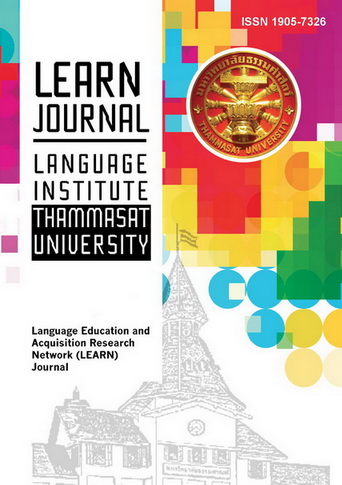Exploring the Role of Identity Construction, Teaching Skills, and Professional Discourse & Awareness: A Study from a Language Methodology Course for EFL Preservice Teachers
Main Article Content
Abstract
This article discusses the role of identity construction, teaching skills, and professional discourse and awareness in language teacher education. The aim is to explore and conceptualize the underlying principles, and explain how these three essential elements help EFL preservice teachers learn how to teach. Evidence gained from the four case studies is employed to highlight these three elements in support of the argument of the main inquiry: What sources of knowledge and skills should be prepared for EFL preservice teachers in a language methodology course? Self-evaluation and constant questioning of the ‘self as teacher’ may help preservice teachers in strengthening their identity construction. Preservice teachers benefit from participating in a community of practice, which fosters improvement of their teaching skills and strategies, as well as their co-construction of professional knowledge. They become aware of, and increase their ability to communicate effectively, based on the norms and standards required by their professional discourse community. These opportunities help increase their confidence and facilitate the use of the target language in the classroom, while learning to be teacher.
Article Details
References
Beauchamp, C., & Thomas, L. (2009). Understanding teacher identity: an overview of issues in the literature and implications for teacher education. Cambridge Journal of Education, 39(2), 175-189. https://doi.org/10.1080/03057640902902252
Beny, R. (1990). The role of language improvement in teacher training:
Killing two birds with one stone. System, 18(1), 97-105.
Bress, P. (2006). Beating stress. Modern English Teacher, 15(3), 9-10.
Chinokul, S. (2012). Development of EFL teaching skills: Knowledge
transfer from methodology course to real classroom practice. Thailand Science Research and Innovation. http://digital.library.tu.ac.th/tu_dc/frontend/Info/item/dc:71346
Cornu, R. L. (2005). Peer mentoring: Engaging pre‐service teachers in mentoring one another. Mentoring & Tutoring: Partnership in Learning, 13(3), 355-366. https://doi.org/10.1080/13611260500105592
Cullen, R. (2001). The use of lesson transcripts for developing teachers’ classroom language. System, 29(1), 27-43.
Davoudi, M., & Sadeghi, N. (2015). A systematic review of research on questioning as a high-level cognitive strategy. English Language Teaching, 8(10), 76-90.
Freeman, D. (2002). The hidden side of the work: Teacher knowledge
and learning to teach. Language Teaching, 35(1), 1-13.
Gholami, K. & J. Husu. (2010). How do teachers reason about their
practice? Representing the epistemic nature of teachers’ practical knowledge. Teaching and Teacher Education, 26(8), 1520-1529.
Hargreaves, A. (1994). Changing teachers, changing times: Teachers’
work and culture in the postmodern age. Cassell.
Hatloy, I. (2012). Understanding anxiety and panic attacks. National
Association for Mental Health.
Hoang, T. & Wyatt, M. C. (2021). Exploring the self-efficacy beliefs of
Vietnamese pre-service teachers of English as a foreign language teachers of English as a foreign language. System, 96, Article 102422.
Lieberman, A. (2000). Networks as learning communities: Shaping the future of teacher development. Journal of Teacher Education, 51(3), 221-227.
Mantero, M. (2004). Transcending tradition: Situated activity, discourse, and identity in language teacher education. Critical Inquiry in Language Studies, 1(3), 143-161. https://doi.org/10.1207/s15427595cils0103_2
Martinez, M. A., Sauleda, N., & Huber, G. L. (2001). Metaphors as blueprints of thinking about teaching and learning. Teaching and Teacher Education, 17(8), 965-977.
McKeachie, W. J. (1986). Teaching tips: A guide book for the beginning
college teacher. Heath.
Medgyes, P. (1999). The non-native teacher (2nd ed.). Max Hueber
Verlag.
Meirink, J. A., Meijer, P. C., Verloop, N., Bergen, T. C. M. (2009).
Understanding teacher learning in secondary education: The relations of teacher activities to changed beliefs about teaching and learning. Teaching and Teacher Education 25(1), 89-100.
Naylor, S. & Keogh, B. (1999). Constructivism in classroom: Theory into
practice. Journal of Science Teacher Education, 10(2), 93-106.
Richards, J. C. (1998). Beyond training: Perspectives on language teacher education. Cambridge University Press.
Richards, J.C. (2010). Competence and performance in language
teaching. RELC Journal, 41(2), 101-122.
Richards, J. C. (2021). Teacher, learner and student-teacher identity in TESOL. RELC Journal, 1-15. https://doi.org/10.1177/0033688221991308
Richards, J. C., & Lockhart, C. (1996). Reflective teaching in second language classrooms. Cambridge University Press.
Schön, D. A. (1983). How professionals think in action. Basic Books.
Shulman, L. S. (1986). Those who understand: Knowledge growth in
teaching. Educational Researcher, 15(2), 4-14. https://doi.org/10.3102/0013189x015002004
Singh, G., & Richards, J. C. (2006). Teaching and learning in the language teacher education course room: A critical sociocultural perspective. RELC Journal, 37(2), 149-175. https://doi.org/10.1177/0033688206067426
Taylor, R. (2002). Shaping the culture of learning communities. Principal Leadership, 3(4), 42-45.
Warin, J., & Muldoon, J. (2009). Wanting to be ‘known’: Redefining self-awareness through an understanding of self-narration processes in educational transitions. British Educational Research Journal, 35(2), 289-303.
Windschitl, M. (2002). Framing constructivism in practice as the negotiation of dilemmas: An analysis of the conceptual, pedagogical, cultural and political challenges facing teachers. Review of Educational Research, 72(2), 131-175.
Wise, K. C. (1996). Strategies for teaching Science: What works? The Clearing House: A Journal of Educational Strategies, Issues and Ideas, 69(6), 337-338.


